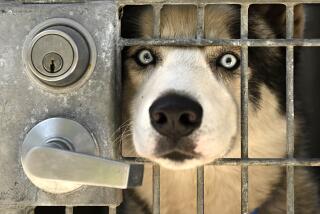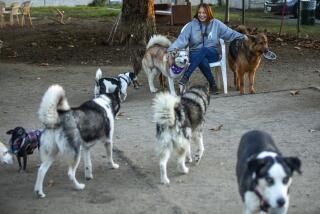Opinion: Erin Auerbach got it wrong; all pets die too soon for us humans
I feel for Erin Auerbach, the Los Angeles writer who spent much of a 13-year period nursing three dogs -- all of them from shelters -- through serious and ultimately fatal illnesses until the last one died in November. I have only respect and admiration for people who devote themselves to the draining (and often expensive) task of caring for sick pets. And, despite my own passionate support for adopting animals from shelters and rescue groups, I can live with the fact that she chose to get her newest dog from a private breeder. From her description, it sounds like she found a responsible breeder. (One good clue -- the breeder had Auerbach come over to the breeder’s house.)
But what I cannot abide by -- and why Auerbach has found herself caught in a firestorm of criticism after writing about her experience with dying dogs for the Washington Post -- is her conclusion that shelter and rescue animals are too risky to adopt. (The headline on her story: “Why I’d never adopt a shelter dog again.”)
“Rescue and shelter dogs are a crapshoot,” she writes. Well, sure, to a certain extent. All pets, no matter where you get them, are a crapshoot. Raising children is a crapshoot. You give them the best nutrition, a comfortable place to live, love them, talk to them, discipline them and hope for the best. And everything I just said applies to animals and children.
Nowhere in Auerbach’s piece does she say how old her dogs were when they were stricken -- only how long she had had them. (There are plenty of adult dogs in the shelters.) Her longest-lived dog, a Boston terrier named Mookie, lived at least 13 years, the last two of those in illness. Here’s the sad thing: Animals die. And they die after what look like short lives -- a decade, maybe two if you are very lucky. And when they reach the twilight of their lives, if they get ill, they need intensive care the way elderly people do. My cat lived to be 18. Along the way, he developed a thyroid problem at 11 that I treated easily with pills for the rest of his life. At 16, he developed kidney disease and I learned to give him subcutaneous injections of fluid every day -- for the rest of his life. Finally he developed lymphoma and he started one round of chemo. He died at home the morning he was scheduled for his second round. It was horrible and heartbreaking and exhausting -- and probably has something to do with why I haven’t gotten another cat yet. But we both had a fabulous time together (well, I hope he felt that way) and that is all that mattered.
Auerbach went in the other direction when each of her dogs died -- she quickly got another one. That’s fine. Her story of pulling her dog Yogi through three years of cancer treatment is nearly heroic. And for that reason alone she doesn’t deserve many of the mean comments launched at her personally.
But, unfortunately, her piece leaves the impression that shelters are filled with animals riddled with latent diseases and weird afflictions -- they are not.
By the way, pet stores (with the exception of the new crop selling only rescued dogs and cats) almost all acquire their wares from puppy mill breeders. And sometimes those puppies are sickly. The overriding reason not to buy an animal from a conventional pet store is to stem the tide of animals from puppy mills. I take issue with blogger Charlotte Allen’s dismissal of animal welfare groups going on campaigns against pet shops. Those campaigns are aggressive, smart and help cripple puppy millers -- something the anemic regulations of the U.S. Department of Agriculture have not been able to do so far.
According to the American Society for the Prevention of Cruelty to Animals, approximately 7.3 million dogs and cats enter animal shelters nationwide each year. Many are relinquished by owners who couldn’t keep them due to a death or divorce in the family, allergies, moving to a place that doesn’t allow pets, living already in a place that doesn’t allow pets. They’re not all being dumped there due to illness or behavior problems. And approximately 2.7 million of them are adopted out each year. Unfortunately, another 2.6 million are euthanized -- which is what makes Auerbach’s story so upsetting to shelter workers and rescuers trying desperately to get animals adopted out.
Increasingly at both private rescue groups and in municipal shelters, the rescuers and shelterers do know a lot about the behavior traits of the animals in their care (some do temperament testing) and, at least, the current state of their health -- and will work with you to find the right pet. The Shelter Pet Project -- a collaboration of the Humane Society of the United States and Maddie’s Fund -- urges owners of new pets having health or behavior problems to call the place from which the owner adopted to see if the place has services that can help.
Some private rescuers do an enormous amount of research on their animals -- and their prospective adopters -- so for anyone deeply worried that he or she will end up with a sick animal, I would find a private rescuer, even of a specific breed, that knows a lot about that breed. And any potential adopter should research the health characteristics of certain breeds.
By the way, shelters are full of mixed breeds -- which can be healthier than purebreds. (I know, I know, I just stepped into another controversy there.) The point is only that mixed breeds are likely to have less of a purebred genetic disposition to various inherited diseases.
And, if you do get a dog from a breeder, make sure it’s one of the responsible breeders who allow you into their homes to see the puppies. But I would urge anyone looking for a pet to try a shelter or a rescue organization first -- and worry less about when they will die than about how to enjoy them while they are alive.
Follow the Opinion section on Twitter @latimesopinion.
More to Read
Start your day right
Sign up for Essential California for news, features and recommendations from the L.A. Times and beyond in your inbox six days a week.
You may occasionally receive promotional content from the Los Angeles Times.







